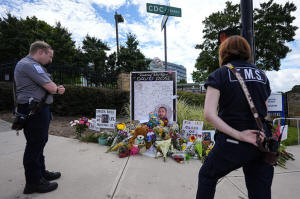CDC shooting marks latest in a string of hostility directed at health
workers. Many aren't surprised
[August 14, 2025]
By JEFF MARTIN, HEATHER HOLLINGSWORTH and JOHN SEEWER
ATLANTA (AP) — A barrage of bullets launched at the headquarters of the
U.S. Centers for Disease Control and Prevention last week by a man
authorities say was angry over COVID-19 vaccinations is the latest
attack directed at health care workers amid hostility lingering from the
pandemic.
Some public health care workers say the shooting that killed a police
officer and rattled the CDC campus shouldn't be surprising in the face
of ongoing misinformation and animosity about the safety of
immunizations.
“All of us, anybody who stands up for science or vaccines, will at some
level get hate mail or a phone call that’s unnerving or a death threat,”
said Paul Offit, the co-inventor of a rotavirus vaccine.
Just four years ago, while hospitals overflowed with unvaccinated
patients, school board members, local leaders and doctors were regularly
confronted in public with taunts comparing them to the Taliban, Nazis
and leaders of Japanese internment camps. Sometimes the conflicts
descended into violence and harassment.
The distrust and anger that grew since then has been amplified by U.S.
Health Secretary Robert F. Kennedy Jr., said Offit, who heads the
vaccine education center at the Children’s Hospital of Philadelphia.
Kennedy has been a leading voice in spreading false information about
vaccines, scientists and public health leaders, often using heated
rhetoric that says they have caused mass death and injury. People he
describes in such language have said his comments have led to threats,
intimidation and even violence.

Kennedy denounces violence but criticizes CDC’s work
Kennedy, who toured the CDC campus on Monday, said no one should face
violence while working to protect the health of others and called
political violence wrong. But he went on to criticize the agency’s
pandemic response.
“One of the things that we saw during COVID is that the government was
overreaching in its efforts to persuade the public to get vaccinated,
and they were saying things that are not always true,” Kennedy said
during a television interview with Scripps News later in the day.
A spokesperson for Kennedy blasted any notion that blamed vaccine
misinformation for Friday’s attack.
“This narrative is pure fiction, built on anonymous complaints and a
willful disregard for the facts,” said Andrew Nixon of the U.S.
Department of Health and Human Services. “Secretary Kennedy is not
advancing an ‘anti-vaccine agenda’ — he is advancing a pro-safety,
pro-transparency, and pro-accountability agenda.”
Authorities have said that 30-year-old Patrick Joseph White had written
about his discontent with the COVID-19 vaccine before he opened fire on
the CDC.
White also had verbalized thoughts of suicide, which led to law
enforcement being contacted several weeks before the shooting, according
to the Georgia Bureau of Investigation. White died at the scene of a
self-inflicted gunshot wound on Friday after killing DeKalb County
Police Officer David Rose.

[to top of second column]
|

A memorial is seen in the aftermath of a shooting near the CDC where
DeKalb County Police Officer David Rose was killed while responding,
Wednesday, Aug. 13, 2025, in Atlanta. (AP Photo/Mike Stewart)
 Shooting rattles CDC campus
Following the attack, CDC employees were asked to scrape off old CDC
parking decals from their vehicles. But even before that, some
workers had taken steps to become less visible, including not
wearing their public health service uniform, said Yolanda Jacobs, a
union leader who represents some CDC workers.
The CDC's new director told employees this week
that no act of violence can diminish their mission to protect public
health.
“We know that misinformation can be dangerous. Not only to health,
but to those that trust us and those we want to trust,” Dr. Susan
Monarez told employees during an “all-hands” meeting Tuesday, her
first since the attack capped her first full week on campus as
director.
The federal agency, tasked with tracking diseases and responding to
health threats, has been hit by widespread staff cuts, key
resignations and heated controversy over long-standing CDC vaccine
policies upended by Kennedy.
“What happened on Friday is a direct result of that misinformation,”
said Sarah Boim, a former CDC worker whose job was targeted for
elimination earlier this year. “Health Secretary Kennedy is one of
the biggest pushers of misinformation.”
The shooting, she said, left her in tears.
“My friends and family still work in those buildings,” she said. “My
mom works in one of those buildings.”
In the aftermath, officials are assessing security and encouraging
staff to report any new threats, including those based on
misinformation about the CDC and its vaccine work.
Anti-vaccine tension has been building
Despite its prominence since the pandemic, anti-vaccine rhetoric
leading to harassment and violence took root before then.

In 2019, an anti-vaccine activist assaulted California state Sen.
Richard Pan, streaming it live on Facebook, after Pan sponsored a
bill to make it more difficult to get a vaccine exemption. Another
threw blood at Pan and other lawmakers.
The attacks came after Kennedy spoke outside the California Capitol,
two large posters behind him featured Pan’s image, with the word
“LIAR” stamped across his face in blood-red paint.
Pan, a pediatrician, blames Kennedy for what happened then and now
at the CDC.
“And you wonder why someone would go shoot up the CDC,” Pan said.
“Because he basically told them that those are the people you should
hurt.”
___
Hollingsworth reported from Kansas City, Missouri, and Seewer
reported from Toledo, Ohio.
All contents © copyright 2025 Associated Press. All rights reserved |